Best Heavy-Duty Casters for Stone Manufacturing and Installation

Imagine a production yard where thousands of pounds of natural stone are shaped, polished, and prepared for installation. Massive slabs, beautiful but unforgiving, must glide across factory floors, staging zones, and job sites without a scratch. When the margin for error is razor-thin, every movement counts.
So what makes transporting such heavy, fragile materials not only possible, but also safe, efficient, and precise?
Casters.
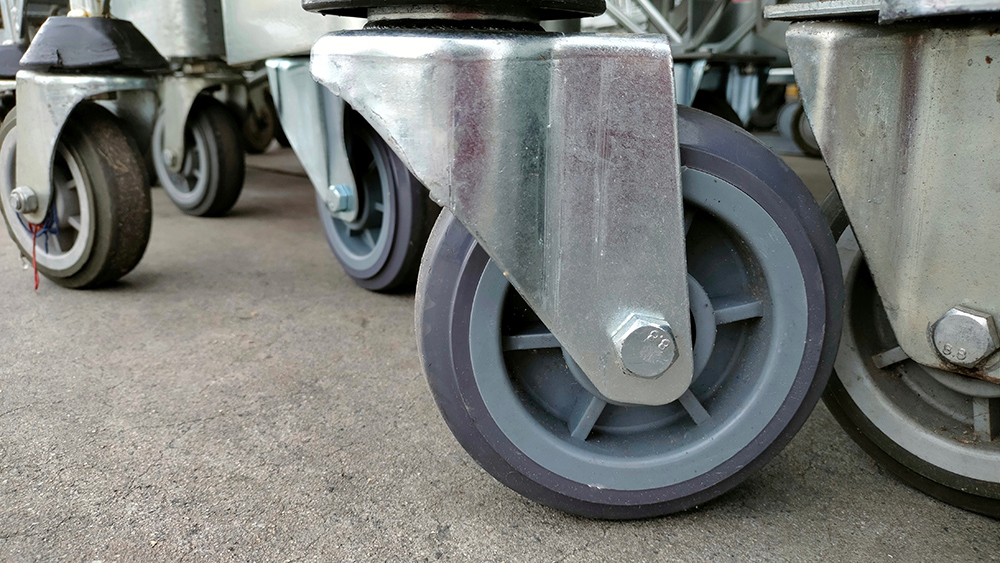
While often overlooked, casters are critical to the success of stone manufacturing and installation. From staging and transporting to final positioning, the right caster solutions can reduce damage, improve safety, and streamline workflows in environments where efficiency is everything.
Let’s explore how high-performance casters support this demanding industry and what to look for when choosing the right solution.
The Unique Challenges of Stone Handling
Handling stone in manufacturing and installation environments presents a complex set of challenges that go far beyond simply managing weight. From the intense physical demands of moving dense materials to the need for delicate precision with fragile surfaces, every step requires equipment that can perform under pressure. The wrong mobility solution can lead to costly damage, safety risks, and project delays. To understand what makes casters essential in this industry, it’s important to first recognize the unique obstacles that come with moving stone.
Weight and Density
Stone isn’t just heavy; it’s dense and unforgiving. Whether working with granite, quartz, marble, or engineered stone, you’re often moving slabs that weigh several hundred to several thousand pounds. Without reliable mobility solutions, transporting these materials becomes a high-risk task.

Fragility Despite Strength
While stone is known for its durability, it’s also prone to chips, cracks, and fractures when mishandled. One poorly supported edge or jolt during transport can ruin a valuable product and hurt your bottom line.

Surface Sensitivity and Precision
Polished surfaces require extra care, and final installations often demand exact placement. Micro-movements, not just major lifts, are vital. Having precise control over movement during staging or installation is key to protecting the product and meeting customer expectations.

Harsh Environmental Conditions
Stonework happens everywhere, from enclosed fabrication shops to open-air yards and unpredictable job sites. That means casters must handle dust, debris, uneven surfaces, and moisture without breaking down.
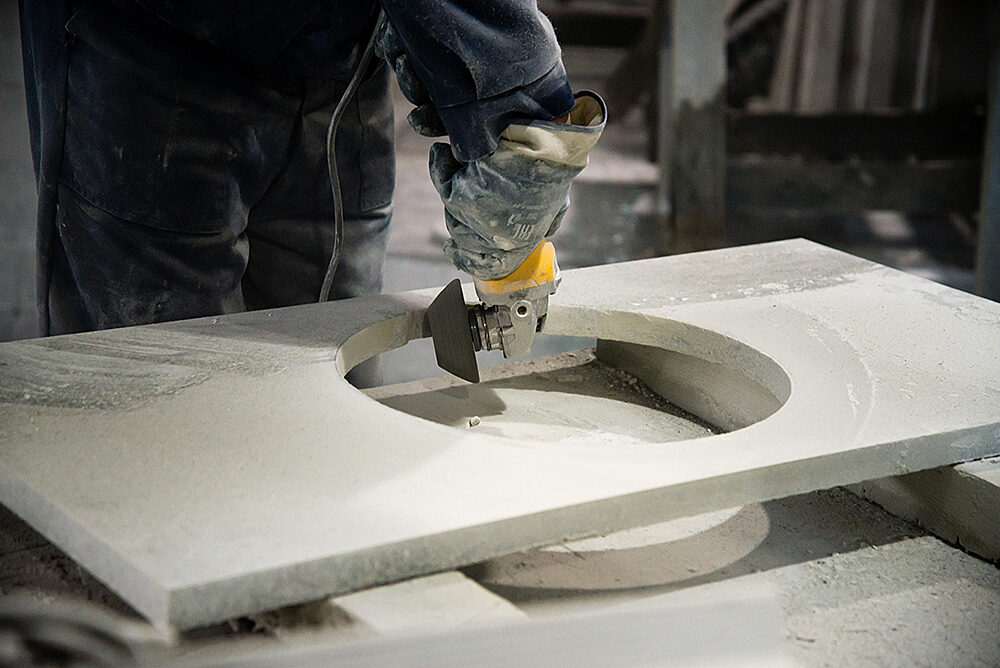
Why Casters Are Essential to Stone Manufacturing Efficiency

Efficient stone handling depends on more than just strength. It requires smart movement strategies that support both safety and speed. Casters make that possible by giving teams greater control over how and where heavy materials are moved. From production floors to unpredictable job sites, the right caster solutions can make daily operations smoother and more responsive.
Mobility of Massive Loads
Whether you’re staging materials indoors or transporting slabs to loading zones, heavy-duty casters offer a simple and scalable way to move extreme loads. They allow for quick repositioning without the delays and coordination required to schedule forklifts or cranes for every shift.
Precision During Placement
Need to nudge a 2,000-pound slab into place for anchoring? With caster-equipped carts or frames, you can fine-tune positioning without needing to lift the slab again. This saves time, prevents product damage, and reduces physical strain on workers.
Reducing Machine Dependency
Casters help reduce the need for heavy machinery when making short moves or adjusting layouts. This added flexibility supports a more agile workflow and helps eliminate labor bottlenecks, especially in crowded production areas or tight job sites.
Key Performance Benefits of the Right Casters for Stone Work
Not all casters are built to handle the demands of stone manufacturing and installation. Selecting the right caster can significantly impact productivity, safety, and product quality. From managing extreme weight to withstanding rough environments, each feature plays a critical role in keeping operations running efficiently and without costly interruptions.
1. Extreme Load-Bearing Capacity
Casters used in stone applications must support substantial weight. Heavy-duty wheels paired with kingpinless rigs prevent deformation, blowouts, or collapse. This ensures stable movement and reduces the risk of accidents or material damage.
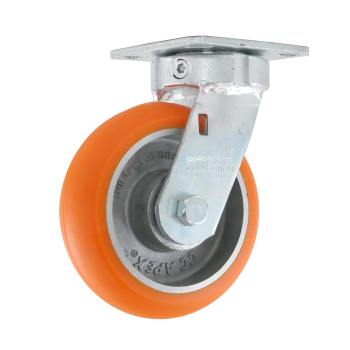
2. Shock Absorption
Stone surfaces, especially polished or fabricated ones, are vulnerable to impact. Shock-absorbing casters cushion the load during transport, protecting materials from cracks, chips, and other imperfections caused by vibration or rough terrain.
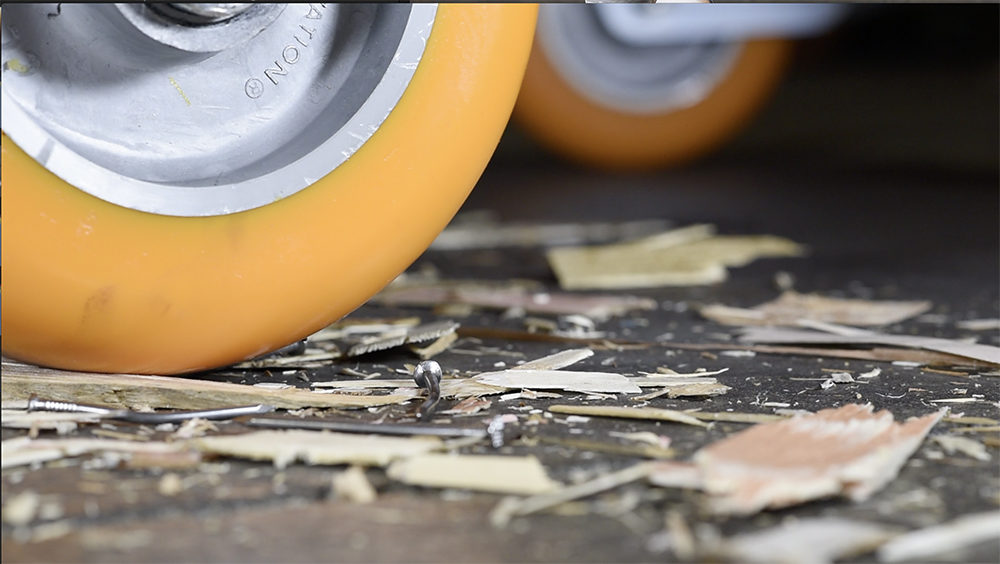
3. Surface Protection
Non-marking wheels reduce the chance of scratching floors or damaging finished stone. Soft tread compounds also help absorb vibration, which protects both the product and the surrounding work environment.

4. Durability in Harsh Conditions
Casters in stone handling environments face constant exposure to dust, debris, moisture, and uneven ground. Sealed bearings, corrosion-resistant materials, and heavy-duty treads are essential for long-term reliability in these conditions.

5. Enhanced Safety
Moving heavy slabs manually poses serious safety risks. Casters reduce the need for lifting or dragging, helping to prevent overexertion and injuries. In addition, quality braking systems keep loads securely in place during cutting, polishing, or final positioning.
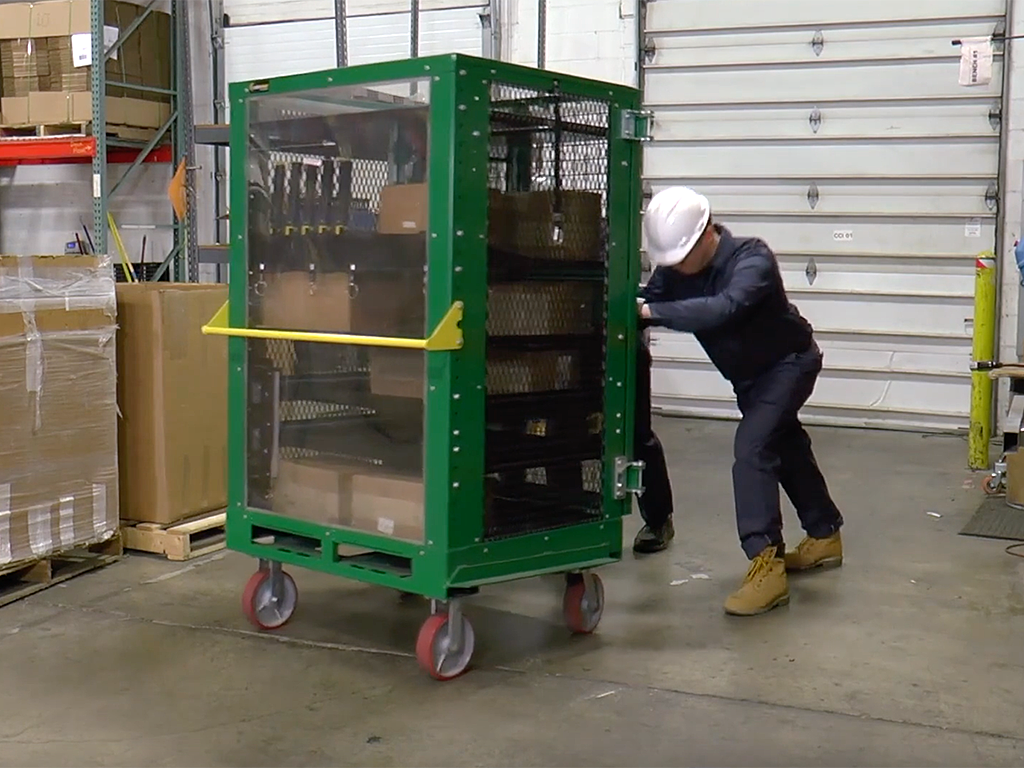
The Life-Saving Power of Braking and Stability
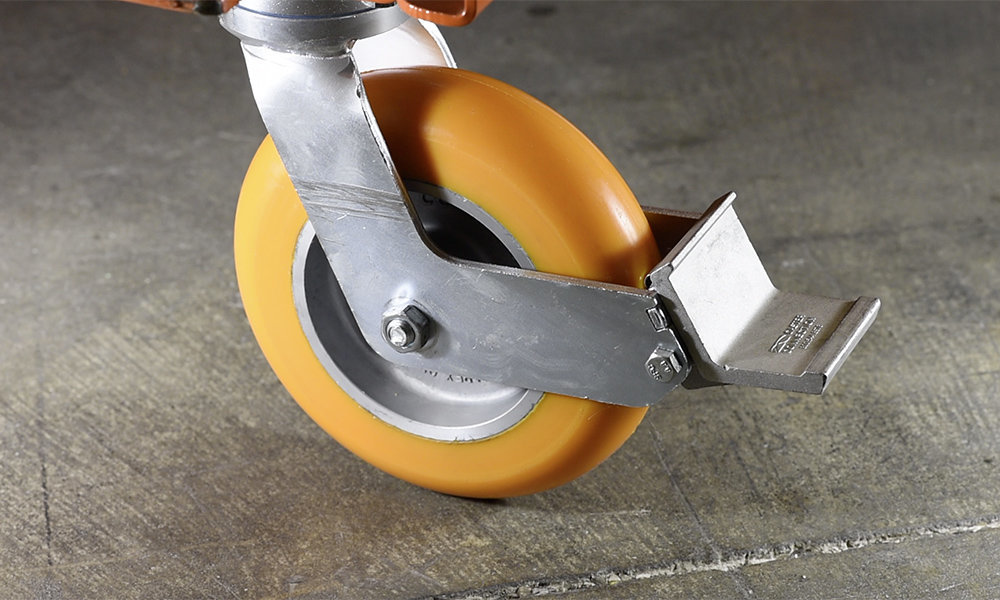
When you’re working with slabs that weigh thousands of pounds, a moment of instability can be fatal. Whether in a fabrication facility or on a job site, the consequences of uncontrolled movement are severe:
• A cart slipping on an incline.
• A slab shifting during cutting or polishing.
• A mobile workstation rolling unexpectedly while in use.
Casters alone aren’t enough—you need braking systems engineered to save lives, not just slow down equipment.
Braking Features That Prevent Disaster

• Deadman Brakes: These spring-loaded brakes automatically engage when a cart handle or pedal is released—stopping movement the moment a user lets go. This fail-safe feature can prevent runaway loads and protect workers during emergencies.
• Floor Locks: These mechanical stabilizers press down onto the floor to hold carts and equipment stationary, even on slight inclines or during high-vibration tasks. They’re ideal for stabilizing heavy carts during cutting, shaping, or inspection.
• Total-Lock Brakes: These brakes simultaneously lock both the wheel and swivel, fully immobilizing the caster and keeping loads secure during transport, staging, or installation.
In combination with the right casters, these braking systems provide critical control in high-stakes environments.
The right brake system doesn’t just protect materials—it protects people.
From preventing roll-aways to ensuring safe handling on uneven terrain, braking technology is a life-saving feature, not a luxury.
What to Look for When Choosing Casters for Stone Applications

Here’s a quick checklist for selecting the right caster solution for your stone operation:
- High Weight Capacity – Rated well above your heaviest load.
- Shock-Absorbing Tread – Protects fragile materials in motion.
- Non-Marking Wheels – Ideal for finished floors and delicate surfaces.
- Sealed Bearings – Keep out dust and debris for longer life.
- Corrosion-Resistant Materials – Withstand wet environments and outdoor work.
- Precision Maneuverability – Smooth, quiet, and responsive under extreme load.
- Reliable Braking Systems – Deadman, floor lock, or total-lock brakes for critical safety and stability.
Real-World Success Story: How Casters Streamline Stone Manufacturing
A commercial stone fabricator specializing in large-format countertops and wall panels was experiencing delays during staging and frequent edge damage during slab transfers. By switching to heavy-duty polyurethane casters with sealed bearings, they saw immediate improvements:
• 50% reduction in product damage
• Staging times cut by nearly 40%
• Safer workflows with less strain on workers
Their caster upgrade transformed daily operations—reducing overhead, increasing throughput, and boosting team morale.

Upgrade Your Stone Handling Strategy
In stone manufacturing and installation, there’s no room for cutting corners. When you’re moving the immovable, you need equipment that matches the strength, reliability, and precision of the material itself.
Casters play a vital role in keeping stone operations safe, efficient, and on schedule. Choosing the right solution not only makes movement easier, it also protects your materials, improves workflow, and helps ensure a successful installation.
Need casters that can handle your heaviest, most fragile loads?
Start Your Caster Needs Evaluation today.
